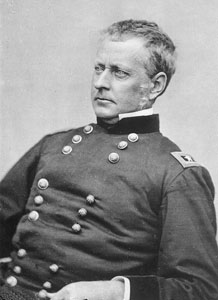| Joseph Hooker  AKA Joseph P. Hooker AKA Joseph P. Hooker
Born: 13-Nov-1814
Birthplace: Hadley, MA
Died: 31-Oct-1879
Location of death: Garden City, Long Island, NY
Cause of death: unspecified
Remains: Buried, Spring Grove Cemetery, Cincinnati, OH
Gender: Male
Race or Ethnicity: White
Sexual orientation: Straight
Occupation: Military Nationality: United States
Executive summary: Union Army General Military service: US Army (1837-53 and 1861-68); Union Army The American general Joseph Hooker was born in Hadley, Massachusetts, on the 30th of November 1814. He was educated at the military academy at West Point (1833-37), and on graduating entered the 1st U. S. Artillery. In the war with Mexico (1846-48) he served as a staff officer, and rose by successive brevets for meritorious services to the rank of lieutenant-colonel. In 1853 he left the service and bought a large farm near Sonoma, California, which he managed successfully till 1858, when he was made superintendent of military roads in Oregon. Upon the opening of hostilities in the Civil War of 1861-65, he sacrificed his fine estate and offered his sword to the Federal Government. He was commissioned brigadier-general of volunteers on the 17th of May 1861 and major-general on the 5th of May 1862. The engagement of Williamsburg (May 5th) brought him and his subordinate Winfield Scott Hancock into prominence, and Hooker received the soubriquet of "Fighting Joe." He was engaged at the battle of Fair Oaks, and did splendid service to the Union Army during the "Seven Days." In the campaign of Northern Virginia, under General John Pope (August 1862), he led his division with fiery energy at Bristoe Station, Manassas and Chantilly. In the Maryland campaign (September) he was at the head of the I. corps, Army of the Potomac, forced the defile of South Mountain and opened the way for the advance of the army. The I. corps opened the great battle of the Antietam, and sustained a sanguinary fight with the Confederates under Stonewall Jackson. Hooker himself was severely wounded. He was commissioned brigadier-general in the United States Army on the 20th of September 1862, and in the battle of Fredericksburg, under Ambrose Burnside, he commanded the center grand division (III. and V. corps.) He had protested against the useless slaughter of his men on that disastrous field, and when Burnsicle resigned the command Hooker succeeded him. The new leader effected a much-needed re-organization in the army, which had fought many battles without success. In this task, as in subordinate commands in battle, Hooker was excelled by few. But his grave defects as a commander-in-chief were soon to be obvious. By a well-planned and well-executed flanking movement, he placed himself on the enemy's flank, but at the decisive moment he checked the advance of his troops. Robert E. Lee turned upon him, Jackson surprised and destroyed a whole army corps, and the battle of Chancellorsville, in which Hooker was himself disabled, ended in a retreat to the old position. Yet Hooker had not entirely forfeited the confidence of his men, to whom he was still "Fighting Joe." The second advance of Lee into Union territory, which led to the battle of Gettysburg, was strenuously resisted by Hooker, who would have inflicted a heavy blow on Lee's scattered forces had he not been condemned to inaction by orders from Washington. Even then Hooker followed the Confederates a day only behind them, until, finding himself distrusted and forbidden to control the movements of troops within the sphere of operations, he resigned the command on the eve of the battle (June 28, 1863.) Faults of temper and an excessive sense of responsibility made his continued occupation of the command impossible, but when after a signal defeat William S. Rosecrans was besieged in Chattanooga, and Ulysses S. Grant with all the forces of the West was hurried to the rescue, two corps of the Army of the Potomac were sent over by rail, and Hooker, who was at least one of the finest fighting generals of the service, went with them in command. He fought and won the "Battle above the Clouds" on Lookout Mountain which cleared the way for the crowning victory of the Army of the Cumberland on Missionary Ridge. And in command of the same corps (consolidated as the XX. corps) he took part in all the battles and combats of the Atlanta campaign of 1864. When General McPherson was killed before Atlanta, the command of Grant's old Army of the Tennessee fell vacant. Hooker, who, though only a corps commander, was senior to the other army commanders, George Henry Thomas and John McAllister Schofield, was normally entitled to receive it, but General William T. Sherman feared to commit a whole army to the guidance of a man of Hooker's peculiar temperament, and the place was given to Howard. Hooker thereupon left the army. He was commissioned brevet major-general in the United States army on the 13th of March 1865, and retired from active service with the full rank of major-general on the 15th of October 1868, in consequence of a paralytic seizure. The last years of his life were passed in the neighborhood of New York. He died at Garden City, Long Island, on the 31st of October 1879.
Father: Joseph Hooker (b. 1763, d. 1852)
Mother: Mary H. Seymour
Sister: Nancy Spear Hooker (b. 1806)
Sister: Mary Seymour Hooker (b. 1808)
Sister: Sarah Rowley Hooker (b. 1811)
Wife: Olivia Augusta Groesbeck
University: US Military Academy, West Point (1837)
Shot: Battle Antietam (17-Sep-1862)
Relieved of Command 27-Jun-1863
Funeral: Abraham Lincoln (1865)
Stroke 1868
Requires Flash 7+ and Javascript.
Do you know something we don't?
Submit a correction or make a comment about this profile
Copyright ©2019 Soylent Communications
|